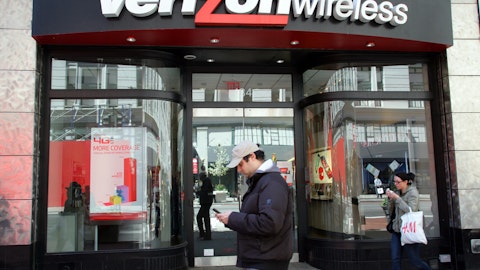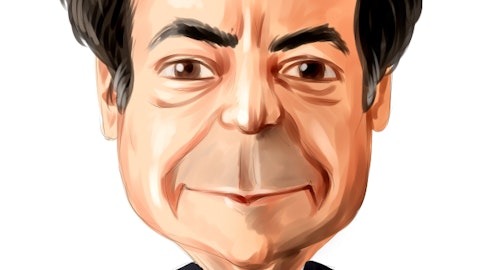Should you invest in AT&T Inc. (NYSE:T)? It’s no surprise that the telecom industry has registered a slowdown in recent years. The smartphone market has reached its saturation point and it’s harder for companies to generate growth by adding new customers. Moreover, tough competition means that it’s harder for telecom companies to retain customers. This is why there have been many mergers and acquisitions in the telecom space. In 2015, there were over 250 deals in the telecom space, preceded by over 300 deals in 2014.
There are several reasons for the increase in M&A activity in the telecom industry. A merger between two telecom companies can allow them to avoid overlapping in certain areas and save money on infrastructure, such as cell towers. In addition, these mergers consolidate their customer bases and allow the companies to enter new markets. Moreover, mergers allow companies to cut customer acquisition costs and provide broader services that can increase customer satisfaction rates and prevent them from leaving for competitors.
Follow At&T Inc. (NYSE:T)
Follow At&T Inc. (NYSE:T)
Receive real-time insider trading and news alerts
Despite many reports of slowdown in the telecom space, accounting and consultancy firm Deloitte expects some growth in the mobile industry this year. According to a report, content and Internet of Things will be two areas in which telecom companies should focus on for the next couple of years, as technology allowing customers to control their homes and cars is becoming more available. Companies should also consider implementing fifth generation (5G) mobile networks, with upgrades potentially costing billions of dollars. Deloitte expects mass-market 5G coverage by 2020.

hin255/Shutterstock.com
However, aside from developments in the telecom industry, companies are also expanding to other areas in order to deliver higher return on investment to shareholders. In this way, Verizon Communications Inc. (NYSE:VZ) acquired AOL in 2015 and is currently in the process of buying Yahoo! Inc. (NASDAQ:YHOO)’s core internet business, which will allow it to tap into the online advertising segment. In AT&T Inc. (NYSE:T)’s case, it is currently in the process of buying Time Warner Inc (NYSE:TWX) in order to get into the content business. The deal is awaiting regulatory approval, with concerns circulating that the Trump administration might oppose the deal. CNN, which is owned by Time Warner, was accused on several occasions by Trump and people close to him of “unfairly” covering the president and his campaign, and of being “fake news”.
Nevertheless, if the merger between AT&T Inc. (NYSE:T) and Time Warner Inc (NYSE:TWX) gets the green light, experts on the Street are talking about the possibility of similar deals, as other big telecom companies like Sprint Corp (NYSE:S) and Verizon would be interested in matching AT&T in the content space. In this regard, Netflix, Inc. (NASDAQ:NFLX) was rumored as a possible takeover target.
On the next page, we will take a closer look at what smart money investors think about AT&T and explain why it is important.
Among Verizon, AT&T Inc. (NYSE:T), and Sprint, AT&T is the second most-popular stock among the investors in our database. We track over 700 hedge funds and other institutional investors and by analyzing their quarterly 13F filings, we identify the popularity of thousands of stocks in terms of the number of funds holding shares. This data allows us to develop investment strategies that generally produce market-beating returns. Our latest strategy managed to outperform the broader indices over the past 12 months. The strategy identifies the 100 best-performing funds of the previous quarter, which we accomplish by using our returns methodology. We then study the portfolios of those 100 funds using the latest 13F data to uncover the 30 most popular mid-cap stocks (market caps of between $1 billion and $10 billion) among them to hold until the next filing period. This strategy delivered 39.7% gains over the past 12 months and outperformed the 24.1% gain enjoyed by the S&P 500 ETFs. Our enhanced small-cap hedge fund strategy returned more than 45% over the last 12 months and outperformed SPY by more than 30 percentage points over the last 4.5 years (see more details).
In AT&T Inc. (NYSE:T), 48 funds held shares heading into 2017, down from 51 funds a quarter earlier. However, the total value of their holdings advanced to $2.79 billion from $2.55 billion. Among these funds, Phill Gross and Robert Atchinson’s Adage Capital Management and Cliff Asness’ AQR Capital Management increased their stakes in the company by 2% and 8% over the quarter, respectively. At the end of 2016, Adage held 8.79 million shares, while AQR disclosed ownership of 8.59 million shares in its latest 13F filing. In addition, D E Shaw, founded by David E. Shaw, almost doubled its AT&T stake during the fourth quarter to 4.09 million shares (the fund also owns ‘Call’ and ‘Put’ options underlying AT&T stock).
Moreover, since there was a decline in the number of funds holding shares of AT&T Inc. (NYSE:T), logic holds that some funds decided to close their positions during the final three months of 2016. Among them, Peter Rathjens, Bruce Clarke and John Campbell’s Arrowstreet Capital closed one of the largest positions, which had contained 6.40 million shares at the end of the third quarter.
So while we cannot say with certainty that smart money approves of AT&T Inc. (NYSE:T)’s decision to acquire Time Warner, we can see that they don’t oppose it either, otherwise, history suggests there would’ve been a significant outflow of capital. At the same time, since the number of investors long Time Warner Inc (NYSE:TWX) surged to 94 from 56 during the fourth quarter, it’s easy to assume that hedge funds believe that there’s a high probability that the deal will go through.
Disclosure: None





